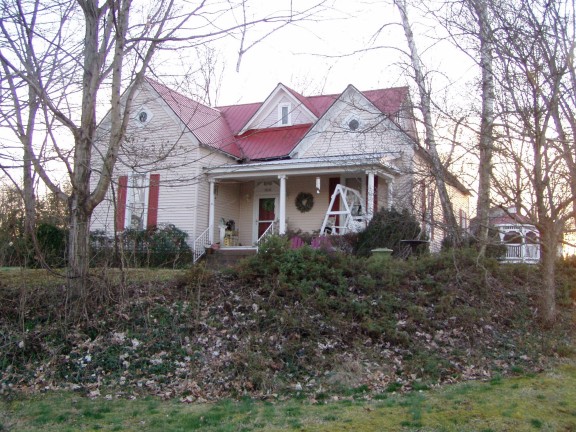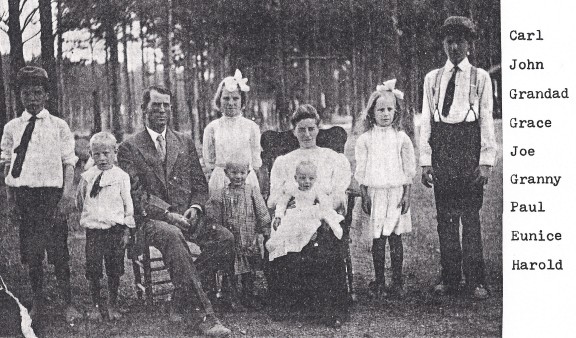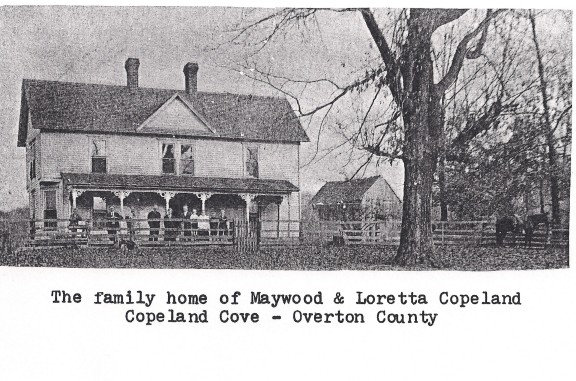|
The Copeland House on Spring Street
|
|
The home on North Spring Street presently owned by Ms. Helen Carter.
|
|
The home located at 416 North
Spring Street in Livingston owned by Ms. Helen Carter is one of the
older historic homes here. Helen purchased the home from Villard Maynord
and wife Mary Lillian Maynord in the mid 1990's. The Maynords had owned
the house for more than twenty years prior to selling it, and for ten of
those years, their son, Charles and wife, Carmel, lived there. Many
changes were made while the Maynord families lived there, including
lowering the 15 foot ceilings to 9 feet. Much of the remodeling was done
by Lowell Stephens and his construction crew. Before going on to share
some history about the house on Spring Street, I want to mention that
for quite a number of years, a family of owls have occupied a hollow
tree that stands at the foot of the hill just down the street from this
home. The type of owl that lives there has several names including the
barred owl, the eight hooter, the rain owl, the wood owl, the stripped
owl, but is best known as the hoot owl. And now, for the rest of the
story.
Many years prior to the Maynordsí purchase of the home, Maywood Copeland and wife Sarah Loretta Keisling Copeland owned the house. Before the Copeland family moved to the Spring Street home, they lived in Copeland Cove in a beautiful large, two story house where their children grew up. The Copeland children in the order of their births were Harold G.; Carl; Grace; Eunice; John Hyder; Joe Ward; Paul; and Lucian Horace. The following is taken from a genealogy booklet prepared by a granddaughter of Maywood and Loretta Copeland, Mrs. Jean Spurrier Farr of Terre Haute, Indiana. Jeanís parents were the late Mrs. Eunice Copeland Spurrier and husband James M. Spurrier. Here are some of her memories about her Copeland grandparents and of time spent in the house on Spring Street:
|
|
|
| "Granny Copeland
was raised on the John Vaughn Farm near Alpine, Tennessee. She and Grandad
went together four years. Granny used to tell us that Grandad didnít kiss
her until they were married. We really didnít believe her. When they
married, Grandad took her to his home to live. Grandad went into the
logging business and moved to logging camps. They lived at Crawford,
Hanging Limb, and Conasaga. They went on the train. Grandad had a
bicycle-type vehicle that ran on the trail rails. He moved his family to a
large house in the Copeland Cove. He continued to log and farm. He was
gone from home a lot and Granny had her hands full with her large family
of eight. Each winter after the children got old enough for high school,
they would rent a house in town. Aunt Grace tells about going back to the
farm with the older boys one summer to put in the crops. She was in her
teens, but cooked their meals and took care of them. There were many
horses on the farm and Grandad had 14 mules he used in logging. Around the
late teens and early twenties, Grandad Copeland and Grandad Spurrier
because business partners in the lumber business. They had a heading
business that was the largest business in Overton County at that time.
"Grandad was a deputy sheriff. He was very conscientious about the job. He hated drinking and was on the trail of any whiskey making he got wind about. He raided one house where an older woman hid the whiskey in bed with her. The circuit court clerk in Overton County was known to be drinking heavy but they couldnít find where he was hiding the whiskey or couldnít catch the man who was bringing it to him. The sheriff thought it was being kept in a false wall in the court house, but of all places, it was kept in a stove in the basement of the Methodist church just next door to the clerkís house. "Granny was afraid of everything. If we went outside after dark, she would tell us a boogy man or a big black dog would get us. If it stormed, she put us on the feather bed. I spent many summers visiting with them. We were up every morning by six for a huge breakfast. Sometimes it would be fried chicken, fish, sausage, or bacon. Always there was gravy and biscuits, plenty of homemade butter, big glasses of milk, and several kinds of sweets. We swept the whole house, made beds, washed dishes, and by eight oíclock, we were sitting on the front porch to watch people going to work and speaking "howdy" to each of them. There were chores to do, such as churning, going to the garden to get vegetables for dinner, the wood box to fill, water to carry from the well, just to name a few. Dinner at noon was another big meal. There was always cornbread, beans, potatoes, greens and all the trimmings. Supper was left-overs or cornbread and milk. Granny had a long table in the dining room. A lot of things were left on the table and covered between meals with a white tablecloth. When the cousins came, we would sneak in and put our heads under the tablecloth and eat whatever was there. Granny kept a bottle of laxative, like Serutan on the table too. "Granny had a wash woman to do her laundry for years. Grandad decided he would buy a washer and do the wash. I donít think he lasted too long at the job. One time when Granny put Grandad to churning, he decided to buy an electric churn. She should have given him the job sooner. When the boys were teens, John had a pet coon. One day Granny found it sticking out of the churn. It was lapping up the buttermilk. "The barn was across the road from the house and down a steep hill by the creek. We loved to go there and play in the creek and barn. The chicken house was there also. We gathered the eggs and carried the milk to the house. "Grandad drove a Model A Ford for years. When one wore out, he pushed it over the hill in the barn lot and got another. It was a real experience to ride with him. Going to town was down a hill and up another very steep one to the square. One day he parked on the hill near the square, and when he came out, the car was in the creek at the foot of the hill. Mom and someone came along and saw it there and were frightened until some men told them that Mr. Copeland wasnít in it. He had gone home and gotten one of the boysí cars and started out again. "Grandad bought a country store at Henard and moved in the house next door. We loved to go there to visit. The candy counter was a big attraction. There was a cracker barrel, a block of cheese, and a lot of things we prowled through. The men in the community would come and sit around the pot-bellied stove. They chewed tobacco and spit on the stove and it would sizzle and pop. There was a big woods across the road where we played. We bathed in the water tank Grandad had for his mill. Grandad bought a banjo and would play it in the evening. Later, he bought a violin and spent a lot of time learning to play it. I like to hear him imitate Uncle Dave Macon of the Grand Ole Opry. The store was later sold, and Grandad and Granny moved back to their house in town.
|
|
|
| "Along with the
house that sat at the top of a hill on Spring Street, Grandad and Granny
owned the land in the whole block, but later sold the back half. The other
line went to the Charlie Gore house. The house was built with a center
hall from the front door to the door going out to the back porch. To the
right in the hall was the parlor. In it was a piano, record player, and a
red velvet parlor set. Granny Copeland gave the parlor set to a Cates
family for plowing the garden. I still canít believe that! "The boysí room was next which later became the dining room. When the old kitchen was torn off, it was moved to the next room. There was a small room upstairs that I remember as a place where the boys had "stuff." There was a small bed up there. Iíve been up there. My sister, Lou, said it was a scary place to her. "The front room on the left was my grandparentsí bedroom and sitting room. They had two large rockers before the fireplace. They were on the front porch in the summer. They had two full size beds, a dresser, and a table with a small radio. "In what was called the middle room, there was a fireplace with two full size beds and a dresser. We lived at my grandparentsí home when my granddad was taken to New Mexico for his asthma. Granny and son, Joe, went with him. My mom and dad slept in one bed, and my sister, my brother, and I slept in the other. We were there to be with the boys. I canít remember how many were still home, but there was six of them. My younger sister was born there when the grandparents were gone. "The Ďlittleí room had a small bed, a wire for hanging clothes, and a chamber pot was kept in there. This room opened on to the back porch. The back porch was screened in on the outside wall. A wide board ran from the screened part to the screen door. On it was the water buckets, wash pans, soap, dishes, etc. On the other wall was an ice box. They did the wash on this porch when it was warm. I also remember churning there. "An interest to me was the little narrow room off the kitchen where the dough cabinet was. The lid raised up and inside were sections for the flour, sugar, the bread board, and the rolling pin. Granny made biscuits every morning. "Grandad was a great reader. He took the Saturday Evening Post for about 50 years. He loved a good story and could talk on many subjects. He told us many stories about the family. He said we had a great heritage because we came from one of the finest families of the early settlers in the country. "Grandad continued in the lumber business on a small scale until he was about 75. The family convinced him that he shouldnít drive anymore. Everyone in town got to the place that they looked out for him and got out of his way. If he couldnít back out of his parking place on the square, he would just drive over the curb and across the courthouse lawn. "Every morning and afternoon, Grandad walked to town. The older men would sit on benches around the courthouse and talk. One day a fellow carrying a brief case sat down by Grandad and Grandad asked him what was in his briefcase. When the fellow said "reading material," Grandad asked him if he ever read the Saturday Evening Post. The man said no, he didnít read dirty magazines. Grandad pounded his cane on the ground and asked him if he hadnít read it, how did he know it was dirty, then jumped up and stalked off in a huff. "After my family moved to Georgia, I came back to Tennessee to spent many summers with Granny and Grandad. We sat on the front porch at night, me on Grannyís lap, and she wrapped her big apron around me. Granddad would tell stories about the family. Grandad had an operation for kidney stones and died when he was 87. Granny died not very long after her 95th birthday. Iíve been interested in genealogy for a long time now, and I really wish I could remember all Granddad told me during those special visits to their home."
|


